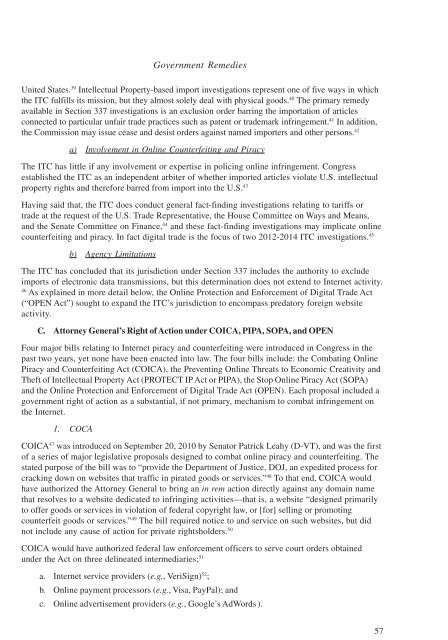1oz61wa
1oz61wa
1oz61wa
Create successful ePaper yourself
Turn your PDF publications into a flip-book with our unique Google optimized e-Paper software.
Government Remedies<br />
United States. 39 Intellectual Property-based import investigations represent one of five ways in which<br />
the ITC fulfills its mission, but they almost solely deal with physical goods. 40 The primary remedy<br />
available in Section 337 investigations is an exclusion order barring the importation of articles<br />
connected to particular unfair trade practices such as patent or trademark infringement. 41 In addition,<br />
the Commission may issue cease and desist orders against named importers and other persons. 42<br />
a) Involvement in Online Counterfeiting and Piracy<br />
The ITC has little if any involvement or expertise in policing online infringement. Congress<br />
established the ITC as an independent arbiter of whether imported articles violate U.S. intellectual<br />
property rights and therefore barred from import into the U.S. 43<br />
Having said that, the ITC does conduct general fact-finding investigations relating to tariffs or<br />
trade at the request of the U.S. Trade Representative, the House Committee on Ways and Means,<br />
and the Senate Committee on Finance, 44 and these fact-finding investigations may implicate online<br />
counterfeiting and piracy. In fact digital trade is the focus of two 2012-2014 ITC investigations. 45<br />
b) Agency Limitations<br />
The ITC has concluded that its jurisdiction under Section 337 includes the authority to exclude<br />
imports of electronic data transmissions, but this determination does not extend to Internet activity.<br />
46<br />
As explained in more detail below, the Online Protection and Enforcement of Digital Trade Act<br />
(“OPEN Act”) sought to expand the ITC’s jurisdiction to encompass predatory foreign website<br />
activity.<br />
C. Attorney General’s Right of Action under COICA, PIPA, SOPA, and OPEN<br />
Four major bills relating to Internet piracy and counterfeiting were introduced in Congress in the<br />
past two years, yet none have been enacted into law. The four bills include: the Combating Online<br />
Piracy and Counterfeiting Act (COICA), the Preventing Online Threats to Economic Creativity and<br />
Theft of Intellectual Property Act (PROTECT IP Act or PIPA), the Stop Online Piracy Act (SOPA)<br />
and the Online Protection and Enforcement of Digital Trade Act (OPEN). Each proposal included a<br />
government right of action as a substantial, if not primary, mechanism to combat infringement on<br />
the Internet.<br />
1. COCA<br />
COICA 47 was introduced on September 20, 2010 by Senator Patrick Leahy (D-VT), and was the first<br />
of a series of major legislative proposals designed to combat online piracy and counterfeiting. The<br />
stated purpose of the bill was to “provide the Department of Justice, DOJ, an expedited process for<br />
cracking down on websites that traffic in pirated goods or services.” 48 To that end, COICA would<br />
have authorized the Attorney General to bring an in rem action directly against any domain name<br />
that resolves to a website dedicated to infringing activities—that is, a website “designed primarily<br />
to offer goods or services in violation of federal copyright law, or [for] selling or promoting<br />
counterfeit goods or services.” 49 The bill required notice to and service on such websites, but did<br />
not include any cause of action for private rightsholders. 50<br />
COICA would have authorized federal law enforcement officers to serve court orders obtained<br />
under the Act on three delineated intermediaries; 51<br />
a. Internet service providers (e.g., VeriSign) 52 ;<br />
b. Online payment processors (e.g., Visa, PayPal); and<br />
c. Online advertisement providers (e.g., Google’s AdWords ).<br />
57


